Bashir on the Beach?
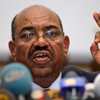
President Bush has been accused of many, many things during his presidency, but as far as I recall, no one has ever accused him of vacationing with a war criminal. That could change if the Sudanese President, Omar al-Bashir, has his way. Bashir wrote a personal letter to President Bush in early December that not only reiterated much of the government’s usual pabulum about Darfur, but added “The Sudanese people and I welcome you personally to Khartoum, even after you leave office.” It appears that President Bashir is already looking back at the tough talk-little action approach of the Bush ...
Preventing Genocide: A Niche Issue?

Last Monday morning I attended the release of Preventing Genocide: A Blueprint for U.S. Policymakers, the culmination of more than a year of work by the Genocide Prevention Task Force, some of the smartest folks in Washington thinking about ways to stop mass atrocities. Listening to former Secretary of State Madeleine Albright and former Secretary of Defense William Cohen come together to say “preventing genocide is possible and that striving to do so is imperative” is incredibly encouraging. The report is mostly spot-on, and Heather Hurlbert rightly applauds its recommendation that genocide prevention be integrated into the existing U.S. foreign ...
One Sudanese “War Child” tells his story
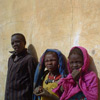
War Child is an award-winning documentary that explores the devastating impacts of 22 years of civil war in Sudan through the story of Emmanuel Jal, a former child soldier turned hip-hop musician and activist. As a child, Jal fought in the Sudan People’s Liberation Army, or SPLA, in the North-South civil war in Sudan resulted in the deaths of over two million people and the displacement of over 4 million others. Jal’s powerful personal story and his current attempts to help his country’s youth gain access to education and opportunity are glimmers of hope even as the conflict in Darfur ...
Warning Clouds Over Chad

Freshly returned from a trip to the region, UN Under-Secretary-General for Humanitarian Affairs and Emergency Relief John Holmes painted a dire picture of the insecurity and banditry plaguing eastern Chad. While Holmes dutifully remained hopeful about the ability of the MINURCAT peacekeeping force to improve the situation, there have been a number of serious warning clouds of late: In July, Refugees International called MINURCAT’s presence in Chad and CAR “largely invisible.” In September, Oxfam blasted the UN’s performance in managing the policing component of MINURCAT. And perhaps most troublingly in October, Doctors Without Borders withdrew their expatriate staff from the ...
The Bush Administration on Somalia: Policy Malpractice
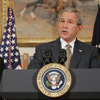
It boggles the mind to imagine how the already horrific situation in Somalia could get much worse. But somehow diplomats in the outgoing Bush Administration are doing their part to turn this crisis into an even greater catastrophe and hijacking the incoming Obama Administration’s policy alternatives by urging Ethiopia to maintain its military presence in Somalia, pressing for an ill-advised U.N. peacekeeping force, and pushing to place Eritrea on the U.S. list of state sponsors of terrorism. See Enough’s statement for details on the potential fallout from these moves ...
The UN In Congo: Peacekeepers or Bystanders?
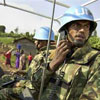
Last week, the New York Times, Human Rights Watch, and the Enough Project provided detailed accounts of the summary executions of an estimated 150 civilians by rebel leader Laurent Nkunda’s CNDP militia in the key town of Kiwanja in eastern Congo. While the rebels terrorized the population of Kiwanja in what HRW called “one of the worst killing sprees” in North Kivu province in the past two years, a contingent of over 100 U.N. peacekeepers was stationed less than a mile away. The New York Times called the Kiwanja massacre a “textbook example” of the continuing failure of MONUC (Mission ...
Bombings in Somalia: The Blowback Continues
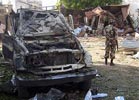
What distinguishes the recent coordinated car-bombings across northern Somalia from the steady stream of bad news to which we have become accustomed coming out of this part of the world? Is this any worse than the civil war, occupation, rendition, targeted assassinations, mass displacement, and epidemic of piracy that have occurred since the United States supported Ethiopia’s intervention in Somalia in December 2006? Unfortunately, it is. The location, targets, and tactics employed in yesterday’s tragedy suggest a dramatic turn for the worse in Somalia. Diplomats, humanitarians, and security professionals must urgently reexamine the policy missteps behind this crisis. Some important ...
‘Concern’ About Refugee Camp Massacre: The Responsibility to Fret?
Early on Monday morning, some 60 vehicles filled with Sudanese forces, reportedly in search of smuggled weapons, surrounded the Kalma camp for internally displaced persons in South Darfur. When the camp residents tried to block the Sudanese forces from entering, government forces opened fire. Against a wall of gunfire, some civilians tried to defend themselves with ‘sticks, knives, and spears.’ Kalma is home to more than 90,000 people, making it one of the largest camps for internally displaced people in the world. The Sudanese military’s attack left some 64 people dead and more than 115 wounded. Victims ranged from 11 ...
U.S. Strategy In Somalia: ‘Whac-A-Mole’
Thursday, August 7, is the ten-year anniversary of the al-Qaeda bombings of U.S. embassies in Kenya and Tanzania. For the better part of ten years, the U.S. government has worked closely with intelligence agencies in Ethiopia and Kenya to track the movements of three al-Qaeda operatives alleged to be responsible for planning the operation, which killed more than 250 people and wounded thousands more. The suspects have frequently taken refuge in Somalia, exploiting the porous borders and ungoverned spaces of the world’s number one failed state. One of those suspects, the alleged leader of al-Qaeda in East Africa Fazul Abdullah ...


